The Effects of Resilience Enhancement Program On Happy Learning among Nursing Students
Main Article Content
บทคัดย่อ
The purpose of this quasi-experimental study was to examine the effects of the resilience enhancement program on happy learning among nursing students. The sample included thirty persons with nursing students who met the inclusion criteria. The participants were randomly assigned into the experimental (n = 15) and the control (n = 15) group. The experimental group received 8 sessions (two sessions per week and each session took about 60 to 90 minutes) of resilience enhancement program, whereas control group received routine nursing care. The Happy Learning of Nursing Student Inventory was used to collect data at pre-post test and one month follow-up. Descriptive statistics, independent t-test, two-way repeated measure ANOVA and multiple comparisons by Bonferroni were employed to analyze the data.
The results of the study were as follows:
1. The mean scores of happy learning between the experimental and control groups at post-test and 1-month follow-up were significantly different (p < .001).
2. In the experimental group, mean scores of happy learning at pre-test, post-test and 1-month follow-up were significantly different (p < .001). And, there were significantly different (p < .05) between mean scores at post-test and 1-month follow-up period.
The study results revealed that the resilience enhancement program enhance happy learning in nursing students. The lecturer and related person in nursing education institution could apply this resilience enhancement program to enhance happy learning in other group.
Article Details
ทัศนะและความคิดเห็นที่ปรากฏในบทความในวารสาร ถือเป็นความรับผิดชอบของผู้เขียนบทความนั้น และไม่ถือเป็นทัศนะและความรับผิดชอบของกองบรรณาธิการ ยินยอมว่าบทความเป็นลิขสิทธิ์ของวารสาร


